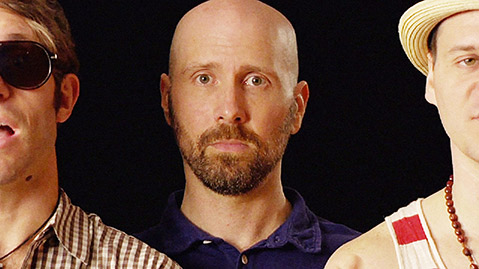Do I Sound Gay?
Director David Thorpe

David Thorpe’s documentary about coming to terms with his own gay voice is gripping and uplifting, but it’s also a near-perfect example of how one person’s story can resonate with so many. Whether you identify as LGBT, know someone who does, or simply have felt like an outsider at one point or another in your life, Do I Sound Gay? is sure to open your eyes a little wider to the world around you.
See doisoundgay.com.
When/how did you decide to turn this idea into a movie? I started working on Do I Sound Gay? literally the day after I had my shame spiral about my voice on the train to Fire Island that’s depicted in the movie. My shame spiral transformed into an epiphany. I should probably keep that in mind.
Were you wary about putting that much of your personal life in front of the camera, and then in front of an audience? I wasn’t wary about putting my personal life in front of the camera because I tricked myself into doing it very gradually and slyly. Originally I wasn’t going to be in the film and then as we moved forward, gradually, more and more, I became the central subject. I set a great trap for myself. I do think it’s easier now than it used to be. So many people are throwing their lives up on social media.
On a logistical level, what was the biggest challenge you faced putting Do I Sound Gay? together? As a first time filmmaker, to me it seemed like everything was a logistical challenge. But I’d say the film’s scripted interludes were the hardest. You have to get like 15 people in a room to work long shooting days for no money on a project that may or may not go anywhere, and we filmed many more than made it into the final film. I had to use every ounce of charm I could muster.
Personally speaking, what was the largest hurdle? The biggest personal challenge was trying to understand what was really going on with me. What did I really want? To change my voice or not? Why would I want one or the other? Although the film is a comedy on the surface, I really did struggle to come to terms with who I wanted to be, as represented by my voice, and with my internalized homophobia. It was a rollercoaster and I didn’t know where I would end up.
Of all the people you interviewed, was there one story that resonated the most? Or one person that you especially identified with? There were two moments early in the making of the film that really stuck with me and were touchstones the whole way through pushing me to finish. Very early on, I interviewed the young guy in the movie who says he hates sounding gay 100-percent and wishes he didn’t. I could understand my own middle-aged self-hatred, but to hear it from someone so young was heartbreaking. The other moment was the dinner party, where one my best friends told me he’s always hated his voice. I thought, ‘how could we never have talked about this?’
What was the biggest personal takeaway from this project? What do you hope others get out of it? My big personal takeaway from making the film was the same one that’s in the movie. It’s ok to be gay. It’s ok to be yourself, including sounding like yourself. It seems obvious, but really learning those basic lessons is much easier said than done. I have no expectations for the audience, but if they take a piece of that away from the film, I’d be so proud.



